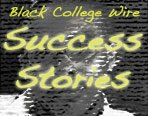| Guilty Verdict in NCCU Grad Student's Death |  |
 |
 |
| By Ashley Roque -- Black College Wire | |
|
After a 15-day trial, Shannon Elizabeth Crawley was found guilty on Feb. 22 for the shooting murder of N.C. Central University student Denita M. Smith. Crawley, a Guilford County 911 operator at the time of the shooting, was convicted of first-degree murder with malice, deliberation and perpetration for the January 4, 2007 murder of Smith. 
Ashley Griffin/Campus Echo
Guilty: Shannon Elizabeth Crawley
Smith had accrued a remarkable set of accomplishments while at NCCU. As an undergraduate she was an Eagle Scholar, a member of Sigma Tau Delta International English Honor Society, a saxophonist with the Sound Machine and a member of the Worship and Praise Inspirational Mass Choir. She had been a reporter and staff photographer for the Campus Echo, earning a fellowship to the New York Times Student Journalism Institute. 
Campus Echo file photo
Denita Smith
She mentored undergraduate students in the Writing Studio, was still contributing news stories to the Campus Echo and had recently crossed to the Alpha Kappa Alpha sorority. The shooting stunned the NCCU community. At a memorial held at B.N. Duke Auditorium after her Jan. 11 funeral, the Rev. Michael Page of Campus Ministry, put the University’s grief like this: “Our hearts are numb. And our minds are confused.” “This is perhaps one of the most tragic cases this court has ever tried,” said Ronald Stevens, the superior court judge who presided over the case. In her testimony, Crawley claimed that Jemeir Stroud, a Greensboro police officer, NCCU alumnus, and Smith’s fiancé, forced her to accompany him to Campus Crossings the day before and the day of the shooting. Crawley and Stroud had been in an intimate relationship for about a year at the same time Stroud was involved with Smith. But cell phone records indicated Crawley was in Durham into the early afternoon, while Stroud’s shift with Greensboro police began at noon. In a video tape made five months after the shooting and while on the stand, Crawley claimed that Stroud forced her to drive him to Campus Crossings. She said that she heard an argument and shots. But Michael Hedgefield, who first identified Crawley’s burgundy Ford Explorer, said that he saw and spoke with a black woman at the scene and did not see a black male. According to Crawley, Stroud came “jogging” and shoved her aside as he got into the driver’s seat. She said that as he turned on the car, he put it in reverse and crawled to the back seat. State forensic investigator’s testified that gunshot residue was found on the front seat of Crawley’s SUV. Crawley testified in the court that she could not see the bottom of the stairs where Smith’s body came to rest. But Saaks in his closing argument, showed a contradictory May 30, 2007 videotape recording of her stating that she “clearly saw the stairs.” In testimony, Ronald Simpson, a 911 coworker of Crawley’s, testified that Crawley had purchased a .38 revolver from him two months before the shooting. Forensics showed that a .38 bullet was used in the murder. Defense attorney Scott Holmes argued in his closing statement that Crawley was in a “cycle of abuse” during the time of Smith’s murder when in fact, both Crawley and Stroud testified that they had ended their relationship one year prior to Smith’s death. On the day that Crawley testified in court, Saaks introduced several audio tapes Crawley claimed she secretly recorded of phone calls Stroud made to her while she was out on bail in the first months of 2008. One tape began with the song, “Murder Reigns” by Ja Rule. But the tapes were clearly suspicious and sounded scripted. Crawley’s voice is very clear, but the other voice has a high-pitched and whispering quality to it. The voice Crawley claimed to be Stroud’s didn’t sound like Stroud. And she did not sound intimidated or afraid for her life. Even Scott Holmes, her public defender, said that the voice “sounded like Michael Jackson” and that Crawley sounded “as cool as a cucumber.” On the audio tapes, there was a very short clip of police radio in the background. “Is that your police radio?” asks Crawley in a very clear voice. Saaks pointed out that police radios usually have constant chatter and mocked the tape, saying that Greensboro must be the “place to live” because it sounds so safe. The tapes were dismissed by Saaks as proof of how far Crawley would go to frame Stroud. Regarding allegations made by Crawley that Stroud had raped her in Charlotte in June 2008, Charlotte investigators found that cell phone records showed that Stroud could not have been on the scene. Investigators also found it suspicious that Crawley had called them to tell them to look in Stroud’s trash can for the knife. But by then, Stroud had already notified Greensboro police that a knife had been planted in his trash can. Neighbors reported seeing a car stop and heard an object land in his trash can. “If Stroud raped her with the knife, then why did he turn the knife in that he found in his trash can? It makes no sense,” said Saaks. Crawley stated that she went downstairs because her puppy was barking. “I am sure Jemeir thought ‘tonight’s the night that the puppy will need to go out,’ ” said Saaks sarcastically. Saaks also asked the jury, “How could someone be raped for three hours in their backyard in the middle of suburbia and no one hear it?” Additionally, clothing retrieved from the scene had puncture cuts that did not match any injuries to her body. On top of that, results from a rape kit test were negative. Saaks claimed that Crawley lied from the beginning. “She is playing you,” he said in his closing argument. Saaks noted that when Crawley was initially questioned on January 5, she denied ever being to Durham and said she had gone to a doctor's appointment on the morning of the shooting. But in the May 30, 2007 videotaped interview, and on the stand, Crawley claimed that she was with Stroud when he shot Smith. Referring back to Crawley’s cell phone records, Saaks pointed out that Crawley’s cell phone had been used the day before the shooting in Durham less than a mile from Smith’s apartment. Crawley claimed that Stroud threatened her life and the life of her children to force her to come to Durham so that he could frame her for Smith’s murder. “When you are in the cycle of abuse, you can't see the obvious solutions in front of you,” said Crawley’s defense attorney. Holmes claimed that the state’s evidence did not fully satisfy whether or not Jemeir Stroud or Crawley committed the murder. In closing, Holmes made much of testimony provided by lead homicide investigator Shawn Pate when he said, “We can neither prove nor disprove that he [Stroud] did it.” Holmes said they investigated Stroud “like a couple of officers at the bar.” But the jury didn’t buy Crawley’s claims that Stroud was involved in the murder. “Is this really the way Jemeir would have done it? He could have lured Denita anytime anywhere. Why involve the defendant? Why would Jemeir involve someone he deemed mentally unstable?” asked Saaks. In his closing argument, Saaks referred back to his opening when he asked the jury to focus on the colors, red and white. Red referred to the burgundy Ford Explorer that Crawley drove to the crime. White referred to the white dress Smith was wearing a month or so before the shooting when she was inducted into the Alpha Kappa Alpha sorority with Stroud, her fiancé, at her side. Then, in what may have been the most powerful moment in the entire trial, he cut to a crime scene photo of Smith’s body covered with a white sheet at Campus Crossings. “If you want to sympathize with someone, sympathize with Denita Smith. Sympathize with her family. Sympathize with North Carolina Central,” said Saaks. Before sentencing, Smith’s mother, Sharon, and her father, Calvain, were given the opportunity to address Crawley and the court. “I may forgive you, but right now, I don’t,” said Smith’s mother. “I hope you burn in hell. You are vile, and you don’t deserve to be a mother.” “The decisions you make will dictate the life you lead,” Smith’s father said. Before he sentenced Crawley, Judge Stevens referred back to the fact that Stroud had been involved with Smith and Crawley simultaneously. “Jemeir Stroud caused the perfect storm to happen, and that was unfortunate for everyone,” he said. |
|
| Posted Mar. 01, 2010 |
| < Prev | Next > |
|---|



